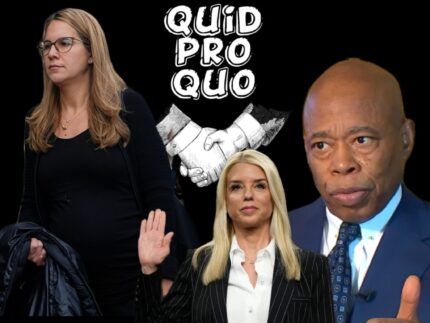Mass Resignations at DOJ | A significant shake-up has rocked the U.S. Department of Justice (DOJ) following a directive to dismiss corruption charges against New York City Mayor Eric Adams. In protest, Acting U.S. Attorney for the Southern District of New York, Danielle Sassoon, resigned alongside senior DOJ officials Kevin Driscoll and John Keller. The resignations come in response to what Sassoon described as an “improper offer of immigration enforcement assistance in exchange for a dismissal of his case.”
The controversy stems from allegations that Mayor Adams offered to support the Trump administration’s immigration enforcement efforts in return for having his corruption case dropped. The DOJ, under the Trump administration, justified the dismissal by arguing that prosecuting Adams could hinder his ability to govern and support federal immigration policies. However, critics see this as a blatant case of political interference undermining the integrity of federal law enforcement.
The Allegations Against Mayor Eric Adams
Mass Resignations at DOJ | Mayor Eric Adams has been accused of accepting illegal foreign campaign contributions and providing political favors to the Turkish government. Among the key allegations is that Adams pressured the New York City Fire Department to approve the opening of the Turkish consulate building without undergoing the required fire inspection. In exchange, he allegedly received over $100,000 in bribes from Turkish officials.
Mass Resignations at DOJ | These claims, if proven, would represent serious violations of federal and state laws. The decision to drop the case has raised suspicions that political considerations, rather than legal merits, played a decisive role in shielding Adams from prosecution. Critics argue that such actions set a dangerous precedent, where those in power can leverage political influence to escape accountability.
Mass Resignations at DOJ | Danielle Sassoon for Justice
Mass Resignations at DOJ | Danielle Sassoon, a distinguished legal professional with credentials from Harvard and Yale, took a principled stand by resigning rather than complying with what she deemed an unethical directive. Having previously clerked for Supreme Court Justice Antonin Scalia, Sassoon has built a reputation for unwavering commitment to the rule of law.
In her resignation letter, Sassoon warned against the erosion of prosecutorial independence, stressing that allowing political influence to dictate legal proceedings compromises the integrity of the justice system. Her departure, along with those of Driscoll and Keller, underscores deep dissatisfaction within the DOJ regarding its handling of politically sensitive cases.
Attorney General Pam Bondi’s Role in the Controversy
Mass Resignations at DOJ | A major point of contention in this unfolding crisis is the role of Attorney General Pam Bondi, who was appointed by President Donald Trump shortly before the directive to dismiss the case against Adams. Sassoon reportedly addressed a formal letter to Bondi, urging her to reconsider the decision. However, Bondi upheld the directive, further fueling accusations of political interference.
Bondi’s involvement has drawn sharp criticism from legal experts and lawmakers who argue that her decision appears to prioritize political expediency over the rule of law. Some have called for congressional inquiries into whether the DOJ acted under undue influence, raising concerns about the independence of federal prosecutors in politically charged cases.
Implications for the DOJ and Public Trust
Mass Resignations at DOJ | The resignations and allegations of a quid pro quo have sparked intense debate about the integrity of the DOJ and its ability to function without political interference. Legal analysts warn that allowing political considerations to dictate prosecutorial decisions undermines the credibility of the justice system and erodes public trust.
With ongoing discussions about the balance between political considerations and the impartial application of justice, this case could have far-reaching consequences for future DOJ operations. Calls for an independent investigation are growing, with watchdog groups demanding greater transparency in prosecutorial decision-making.
As the situation unfolds, the American public will be watching closely, eager to see whether justice will prevail or whether political influence will once again shape the course of legal proceedings.














